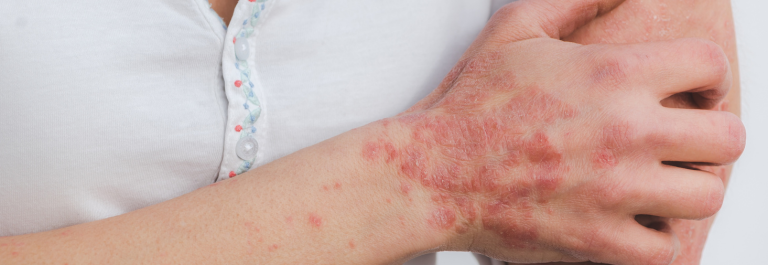Are you dealing with dry, flaky skin on your face? Rest assured that you're not the only one! While most people experience dryness on their face from time to time, there are natural remedies that can help you treat dry skin for good. In this post, we will discuss:
-
Causes of dry skin
-
Natural products for soothing dry skin patches on your face
-
Ways you can prevent dry skin
Read on to discover more about how to relieve dry skin on your face.
What Causes Dry Skin on the Face?
Covering the entire external surface of your body, your skin is your largest organ. It has many roles:
-
It helps regulate your temperature.
-
It detects touch and other sensations.
-
It acts as a protective barrier for your bones and internal organs.
Dry skin happens when water is lost from the outside layer of the skin. This might occur due to low levels of water in the skin or if there is a lack of compounds needed to keep skin hydrated, such as natural oils, lactic acid, or sugars.
There are many reasons that you might experience symptoms of dry skin. We'll review some of the main contributors to dry, itchy skin on the face below.
Skin Type
Everyone's skin is different; some may notice that their skin tends towards dryness, while others might find their skin condition oily. When you experience dryness on your face, your skin produces less sebum (natural oils) than other skin types. It might make it harder to keep your skin hydrated, so you experience dry, flaky skin.
Environmental factors
You may have found that you are particularly prone to dry facial skin once the cold weather hits. This isn't a coincidence - temperature or humidity levels are significant factors that contribute to dry skin because they reduce the availability of environmental moisture. As a result, you might notice dry skin appearing in the winter months or that colder temperatures worsen the dry skin you already experience. Those who live in climates with dry air are more likely to experience extremely dry skin because of a general lack of moisture in the air, making it harder for your skin to stay hydrated.
Aging Process
Like it or not, aging is a fact of life. As we grow older, the amount of oil that our skin naturally produces to keep it hydrated starts to slow down. This means that the older we get, the more prone we are to experience dry skin conditions on our face and body. Older adults are more likely to encounter dry, cracked skin vulnerable to infection. It's a good idea to keep an idea on any dry skin patches that have become red, painful, or warm to the touch and seek support from a healthcare practitioner if you have areas of concern.
Medical Conditions
There is a whole host of medical conditions that can make it difficult for skin to retain moisture. These include
-
Skin conditions like seborrheic dermatitis, contact dermatitis, psoriasis, eczema (atopic dermatitis), or rosacea
-
Thyroid or endocrine disorders, like diabetes, kidney disease, hyperthyroidism, hypothyroidism
-
Certain medications, such as steroids, retinoids, statins, diuretics, steroids, beta-blockers, or cholesterol-lowering drugs
-
Vitamin or mineral deficiencies, including Vitamins A & D, iron, and zinc
Other Common Dry Skin Factors
There are so many reasons that you may experience dry, flaky skin. In addition to the already mentioned contributors, you might want to consider:
-
Do you take frequent long hot showers? This heat can strip the natural oils that you need to keep the skin moist
-
Do you use harsh soaps or other skincare products with drying ingredients, like sodium lauryl sulfate, alpha hydroxy acid, or synthetic fragrance?
-
Are you drinking enough water? An easy way to help your skin retain moisture is to give it enough hydration in the first place! Eight to ten glasses a day is the recommended serving.
How Do I Get Rid of Dry Flaky Skin on My Face?
One of the best things you can do for the dry skin patches on your face is to use natural skin care products made specifically for sensitive skin. Luckily, many options on the market can help for relieving dry skin.
Organic Manuka Skin Soothing Cream
Whether you're soothing dry skin or preventing it from happening in the first place, your first line of defense is to apply moisturizer made with sensitive skin in mind. This Nourish + Hydrate Manuka Balm is a fatty balm made with Manuka honey, sunflower oil, camelia seed oil, and beeswax to nourish and protect the dry patches on your face. It can be used head-to-toe and is safe for children and adults. Gently rub the moisturizer into your skin to relieve the dry patches on your face.
Coconut Sunflower Oil Soap
When you have dry, flaky skin, it's best to use a natural fragrance free cleanser to ensure that you support the moisture barrier on the delicate skin of your face. This Coconut Sunflower Oil Soap Bar is a gentle cleanser that is ideal for use on the whole body in those with sensitive skin conditions. It's also mild enough to use on kids and babies.
Do's and Don'ts for Combatting Dry Facial Skin
DO
-
Use a gentle cleanser and apply moisturizer regularly
-
Use natural and fragrance free skin care products
-
Wear a broad spectrum sunscreen and avoid sun exposure
-
Wash your face with cool or warm water instead of hot water
-
Seek the support of a healthcare practitioner if you feel that you might have a medical condition impacting your skin condition or if your symptoms persist or worsen.
AVOID
-
Using soaps or other skin care products with lots of harsh chemicals
-
Taking long hot showers
-
Trying to get rid of flaky skin by using aggressive physical or chemical exfoliators, which will only worsen symptoms of dry skin
-
Beating yourself up! While dry skin on your face can be frustrating - and sometimes even embarrassing - there are lots of things you can try to heal dry skin on your face
Deal with Dry Skin on the Face the Natural Way
Dry patches on the skin on your face are common but highly treatable. Try our tips to naturally maintain and add moisture to your skin's surface today!










